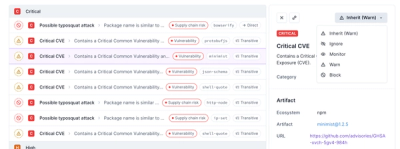
Research
Security News
Malicious npm Package Typosquats react-login-page to Deploy Keylogger
Socket researchers unpack a typosquatting package with malicious code that logs keystrokes and exfiltrates sensitive data to a remote server.
@privacybydesign/irmajs
Advanced tools
Readme
irma-legacy is a wrapper around irma-core and several irma-frontend-packages plugins realizing backwards
compatibility with the legacy irmajs Javascript library.
irmajs provides a Javascript client of the RESTful JSON API offered by the
irma server.
It allows you to use the irma server to:
irma server and the IRMA app).Only use this module when you need backwards compatibility with the legacy irmajs function calls.
If you are new to irma-frontend-packages, please use the irma-frontend module or make your own
composition of plugins and use irma-core as main module.
Due to technical changes in IRMA, we were not able to realize full backwards compatibility with irmajs.
All changes are related to the function call handleSession.
canvas is not supported anymore. Please use the module irma-frontend instead or make
your own composition of plugins and layouts using irma-core.
This also means the canvas related options element and showConnectedIcon are deprecated.mobile has the same behaviour as method popup now. On mobile devices, the popup
mode automatically detects whether a mobile device is used and then shows the user the option to open
the IRMA app installed on the mobile device itself. It is now an explicit choice, so users can also get
a QR on mobile devices instead (useful for tablets).disableMobile is not useful anymore and therefore deprecated. This module does not have
automatic redirects to other apps anymore without explicit user interaction.detectUserAgent and the undocumented exported struct UserAgent are also deprecated. An explicit
distinction based on user agent is not necessary anymore. This is all handled internally now.returnStatus is deprecated. Instead you can use the functions waitConnected and waitDone
to detect yourself whether the session reached a certain status.If you experience problems concerning the backwards compatibility other than the ones mentioned above, please contact us. It might be something we were not aware of. Then we can maybe fix it.
Technical documentation of irmajs can be found at irma.app/docs.
Compile the library:
npm install
npm run build
This writes irma.js and irma.node.js to the dist folder. irma.js is the browser variant,
which you can include in your website in a <script> tag. irma.node.js is the library variant
for usage in node.js. To reduce the module size, the JWT support is split off in the separate files
jwt.js and vendors~jwt.js. When you want to use the function signSessionRequest, these
files must be available in the same directory as irma.js or irma.node.js.
If you have included irma.js (e.g. <script src="irma.js" defer></script>) you can start an IRMA
disclosure session as follows:
const request = {
'@context': 'https://irma.app/ld/request/disclosure/v2',
'disclose': [
[
[ 'irma-demo.MijnOverheid.ageLower.over18' ]
]
]
};
irma.startSession(server, request)
.then(({ sessionPtr, token }) => irma.handleSession(sessionPtr, {server, token}))
.then(result => console.log('Done', result));
The example assumes you have an irma server that is configured to accept unauthenticated session
requests listening at the URL indicated by server. More information about the format of session
requests can be found in the documentation.
For complete examples, see the irma-legacy examples in the examples folder.
If you want to build one of the included irma-frontend-packages modules from
source, for example when testing, please make sure you run ./build.sh
in the root directory of irma-frontend-packages.
You can link local versions of modules easily using npm link. There is
an explanation about how to use npm link in the README of the
irma-frontend-packages root directory.
FAQs
Unknown package
The npm package @privacybydesign/irmajs receives a total of 1 weekly downloads. As such, @privacybydesign/irmajs popularity was classified as not popular.
We found that @privacybydesign/irmajs demonstrated a not healthy version release cadence and project activity because the last version was released a year ago. It has 5 open source maintainers collaborating on the project.
Did you know?

Socket for GitHub automatically highlights issues in each pull request and monitors the health of all your open source dependencies. Discover the contents of your packages and block harmful activity before you install or update your dependencies.

Research
Security News
Socket researchers unpack a typosquatting package with malicious code that logs keystrokes and exfiltrates sensitive data to a remote server.

Security News
The JavaScript community has launched the e18e initiative to improve ecosystem performance by cleaning up dependency trees, speeding up critical parts of the ecosystem, and documenting lighter alternatives to established tools.

Product
Socket now supports four distinct alert actions instead of the previous two, and alert triaging allows users to override the actions taken for all individual alerts.